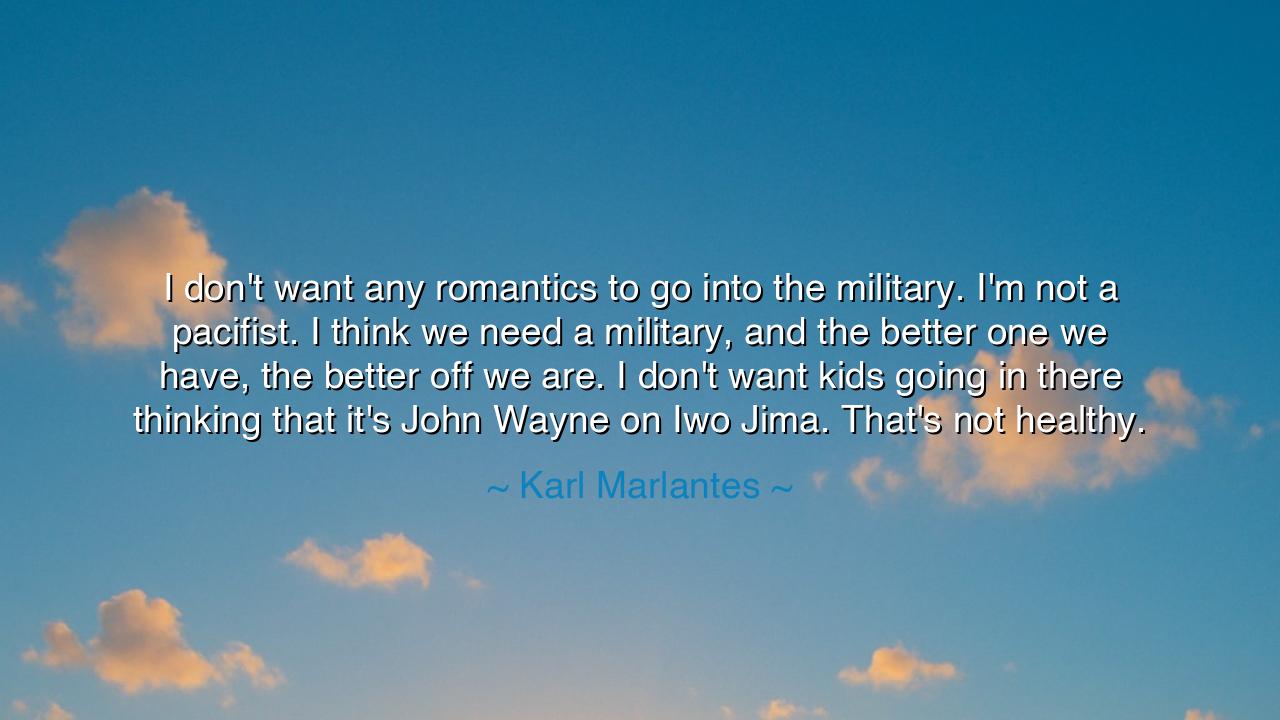
I don't want any romantics to go into the military. I'm not a
I don't want any romantics to go into the military. I'm not a pacifist. I think we need a military, and the better one we have, the better off we are. I don't want kids going in there thinking that it's John Wayne on Iwo Jima. That's not healthy.






In the words of Karl Marlantes, "I don't want any romantics to go into the military. I'm not a pacifist. I think we need a military, and the better one we have, the better off we are. I don't want kids going in there thinking that it's John Wayne on Iwo Jima. That's not healthy," we are invited to reflect on the reality of war and the dangers of romanticizing it. Marlantes’ statement is a warning against the idealized view of warfare, where bravery and honor are often portrayed through the lens of glorified heroism—an image that overlooks the grim truth of battle. Marlantes, himself a veteran, understands the consequences of war in its rawest form, and his words challenge us to confront the harshness and complexity of conflict, urging us to see war as it truly is, not as a narrative of heroism and glory alone.
In the ancient world, war was similarly romanticized, but those who participated in battle were often acutely aware of the cost. Homer’s Iliad, for example, speaks of the great heroes of the Trojan War—Achilles, Hector, and others—whose courage on the battlefield is legendary. However, Homer does not shield us from the suffering and tragedy that accompanies war. Achilles, in his rage and pride, brings about the death of Patroclus, his beloved companion, only to realize too late the cost of his vengeance. The romantic image of the warrior, in Homer’s depiction, is undercut by the horrors and loss of war. The Greeks understood that true heroism was not in the glory of battle, but in the recognition of its inevitable consequences—death, destruction, and grief.
Similarly, in the history of the Romans, war was often portrayed as a necessary evil, but it was also framed as a test of virtue and endurance. Julius Caesar, in his Commentarii de Bello Gallico, recounts the military conquests of Rome, not just as acts of victory but as efforts marked by sacrifice and the constant awareness of the cost of power. While Caesar himself is often portrayed as a hero, there is a grittiness to his writings—an acknowledgement that war is never merely about the conquest of lands, but about the suffering of those who fight. Marlantes, in his plea to avoid romanticizing war, aligns with this ancient understanding: war should not be viewed through the lens of glory, but rather as a necessary hardship that must be approached with soberness and understanding.
In modern history, the Vietnam War provides a stark example of the dissonance between romantic ideals of warfare and its devastating realities. The film culture of the 20th century, influenced by characters like John Wayne, painted war as a space for heroic action, where soldiers were often depicted as undaunted by fear or pain. Yet, those who returned from the Vietnam War, like Marlantes, experienced the psychological and physical scars of war. The romanticized portrayal of soldiers in Hollywood and other forms of media failed to convey the chaos, the suffering, and the moral complexities that soldiers face in real battles. Marlantes’s critique highlights the danger of portraying soldiers as mere heroes without showing the deep emotional and moral conflicts that arise during and after combat.
Marlantes is not a pacifist, as he clearly states—he acknowledges the necessity of a military and the protection it provides. However, he draws a distinction between the reality of war and the idealized vision of it, urging us to approach military service with a clear understanding of its complexity and the mental toll it takes on those who serve. In ancient times, warriors like Hannibal and Alexander the Great were revered for their military prowess, yet the ancients understood that true leadership in battle involved more than glory—it required wisdom, compassion, and an understanding of the grave responsibility that came with leading men into war. Hannibal’s campaigns, for instance, are marked by tactical brilliance but also by the human cost that comes with military conquest.
The lesson that Marlantes offers, then, is one of reality—a call to strip away the romanticism that often clouds our understanding of war. His words remind us that the idealized vision of war—the glorious battles and unstoppable heroes—are not reflective of the actual experiences of those who serve. In this context, we must recognize that warfare is not a space for fantasy, but a reality that demands a deep and sober understanding of its consequences. To truly honor those who serve in the military, we must look beyond the glamorized images and see the human cost of conflict, recognizing the sacrifices and the psychological toll that come with it.
In your own life, consider the lessons of Marlantes’s words. When faced with conflict or difficult decisions, recognize that not everything is as simple as the stories we are often told. Real heroism lies not in romanticized battles, but in the willingness to face the complexity of situations with wisdom and integrity. Seek to understand the true cost of the paths you choose, whether they lead you to war or to peace, and approach them with the awareness that there are consequences to every action. Recognize that true strength lies not in glorifying the struggles, but in understanding and accepting their deeper truths. Just as the ancients knew, so must we embrace the reality of our choices, and in doing so, find our own path toward true wisdom and compassion.






AAdministratorAdministrator
Welcome, honored guests. Please leave a comment, we will respond soon